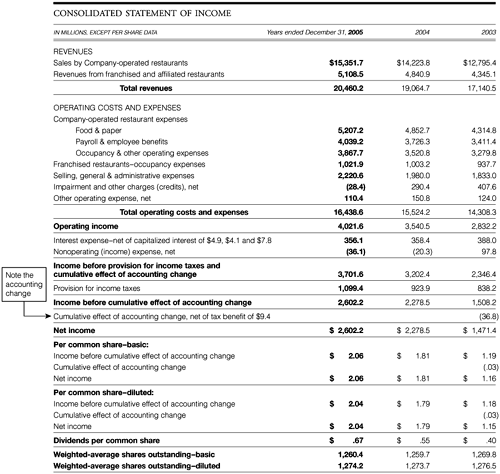Accounting Changes
Accounting changes represent changes in a company’s accounting methodology governing the reporting of its financial statements, and are reported net of taxes on a separate line item following extraordinary items (Exhibit 5.10).
Exhibit 5.10. Accounting Changes Represent Changes in a Company’s Accounting Methods
Source: Used with permission of McDonald’s Corporation. 2005 Annual Report, © McDonald’s Corporation, 2005.
Types of accounting changes include:
Changes Applied to New Transactions
New transactions occur only after the accounting change takes place.
No adjustments to current financial statements are required.
Example: Applying a different depreciation method to new assets.
Changes in Estimates
Can be associated with useful lives and salvage value of depreciable assets as well as value of uncollectible revenue (e.g., Bad Debt Expense is an estimate).
Changes are made only in the affected (present and/or future) period(s); past results remain as originally reported.
Retroactive Changes in Accounting Principles
If the company chooses to apply newly adopted accounting principles retroactively (to the past results), the impact of this change on prior periods is shown as a separate item on the income statement called “Cumulative Effect of the Accounting Change on Prior Periods.”
Certain events are not expected to recur, and their placement on ...
Get Crash Course in Accounting and Financial Statement Analysis, Second Edition now with the O’Reilly learning platform.
O’Reilly members experience books, live events, courses curated by job role, and more from O’Reilly and nearly 200 top publishers.

